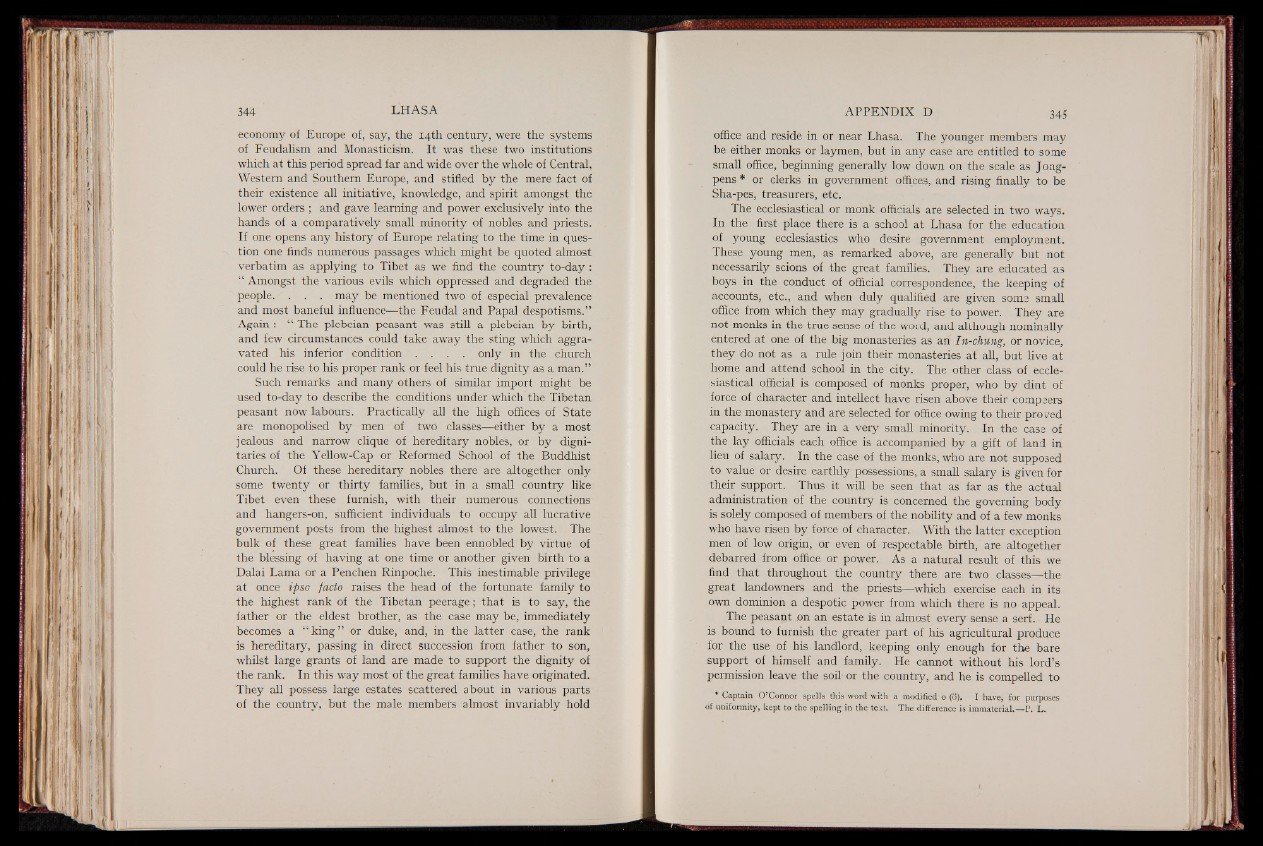
economy of Europe of, say, the 14th century, were the systems
of Feudalism and Monasticism. It was these two institutions
which at this period spread far and wide over the whole of Central,
Western and Southern Europe, and stifled by the mere fact of
their existence all initiative, knowledge, and spirit amongst the
lower orders ; and gave learning and power exclusively into the
hands of a comparatively small minority of nobles and priests.
If one opens any history of Europe relating to the time in question
one finds numerous passages which might be quoted almost
verbatim as applying to Tibet as we find the country to-day :
“ Amongst the various evils which oppressed and degraded the
people, v . . . may be mentioned two of especial prevalence
and most baneful influence— the Feudal and Papal despotisms.”
Again : “ The plebeian peasant was still a plebeian by birth,
and few circumstances could take away the sting which aggravated
his inferior condition . . . . only in the church
could he rise to his proper rank or feel his true dignity as a man.”
Such remarks and many others of similar import might be
used to-day to describe the conditions under which the Tibetan
peasant now labours. Practically all the high offices of State
are monopolised by men of two classes— either by a most
jealous and narrow clique of hereditary nobles, or by dignitaries
of the Yellow-Cap or Reformed School of the Buddhist
Church. Of these hereditary nobles there are altogether only
some twenty or thirty families, but in a small country like
Tibet even these furnish, with their numerous connections
and hangers-on, sufficient individuals to occupy all lucrative
government posts from the highest almost to the lowest. The
bulk of these great families have been ennobled by virtue of
the blessing of having at one time or another given birth to a
Dalai Lama or a Penchen Rinpoche. This inestimable privilege
at once ipse facto raises the head of the fortunate family to
the highest rank of the Tibetan peerage; that is to say, the
father or the eldest brother, as the case may be, immediately
becomes a “ king” or duke, and, in the latter case, the rank
is hereditary, passing in direct succession from father to son,
whilst large grants pf land are made to support the dignity of
the rank. In this way most of the great families have originated.
They all possess large estates scattered about in various parts
of the country, but the male members almost invariably hold
office and reside in or near Lhasa. The younger members may
be either monks or laymen, but in any case are entitled to some
small office, beginning generally low down on the scale as Jong-
pens * or clerks in government offices, and rising finally to be
Sha-pes, treasurers, etc.
The ecclesiastical or monk officials are selected in two ways.
In the first place there is a school at Lhasa for the education
of young ecclesiastics who desire government employment.
These young men, as remarked above, are generally but not
necessarily scions of the great families. They are educated as
boys in the conduct of official correspondence, the keeping of
accounts, etc., and when duly qualified are given some small
office from which they may gradually rise to power. They are
not monks in the true sense of the word, and although nominally
entered at one of the big monasteries as an In-chung, or novice,
they do not as a rule join their monasteries at all, but live at
home and attend school in the city. The other class of ecclesiastical
official is composed of monks proper, who by dint of
force of character and intellect have risen above their compeers
in the monastery and are selected for office owing to their pro ved
capacity. They aite in a very small minority. In the case of
the lay officials each office is accompanied by a gift of land in
lieu of salary, In the case of the monks, who are not supposed
to value or desire earthly possessions, a small salary is given for
their support. Thus it will be seen that as far as the actual
administration of the country is concerned the governing body
is solely composed of members of the nobility and of a few monks
who have risen by force of character. With the latter exception
men of low origin, or even of respectable birth, are altogether
debarred from office or power. As a natural result of this we
find that throughout the country there are two classes— the
great landowners and the priests— which exercise each in its
own dominion a despotic power from which there is no appeal.
The peasant „on an estate is in almost every sense a serf. He
is bound to furnish the greater part of his agricultural produce
for the use of his landlord, keeping only enough for the bare
support of himself and family. He cannot without his lord’s
permission leave the soil or the country, and he is compelled to
* Captain O’Connor spells this word with a modified o (o). I have, for purposes
of uniformity, kept to the spelling in the text. The difference is immaterial.— P. L.